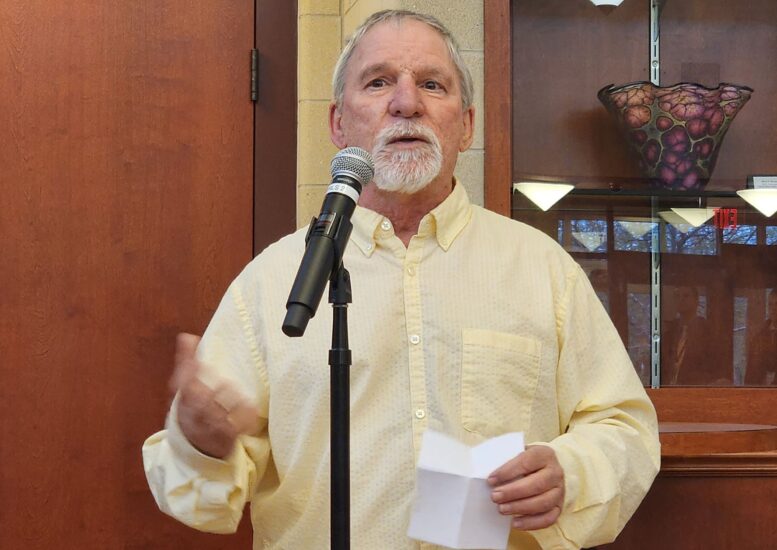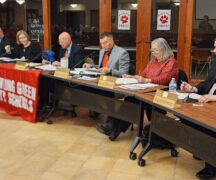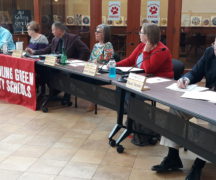By JAN McLAUGHLIN
BG Independent News
As the May 6 election nears for the Bowling Green City Schools’ operating levy, former Bobcats and current citizens spoke at the school board meeting Tuesday evening, urging the community to support the ballot issue.
James Shroyer, a member of the 1978 BGHS graduating class, said his class awards scholarships to students each year, and has put aside money so that will continue long after they are gone.
Shroyer said his four sons were graduates of BGHS, and were involved in sports – which will be gone if the levy fails. It’s time for the community to stand up to support the district, he said.
“The generation above me was there to support me when I went through school,” he said. “I support this.”
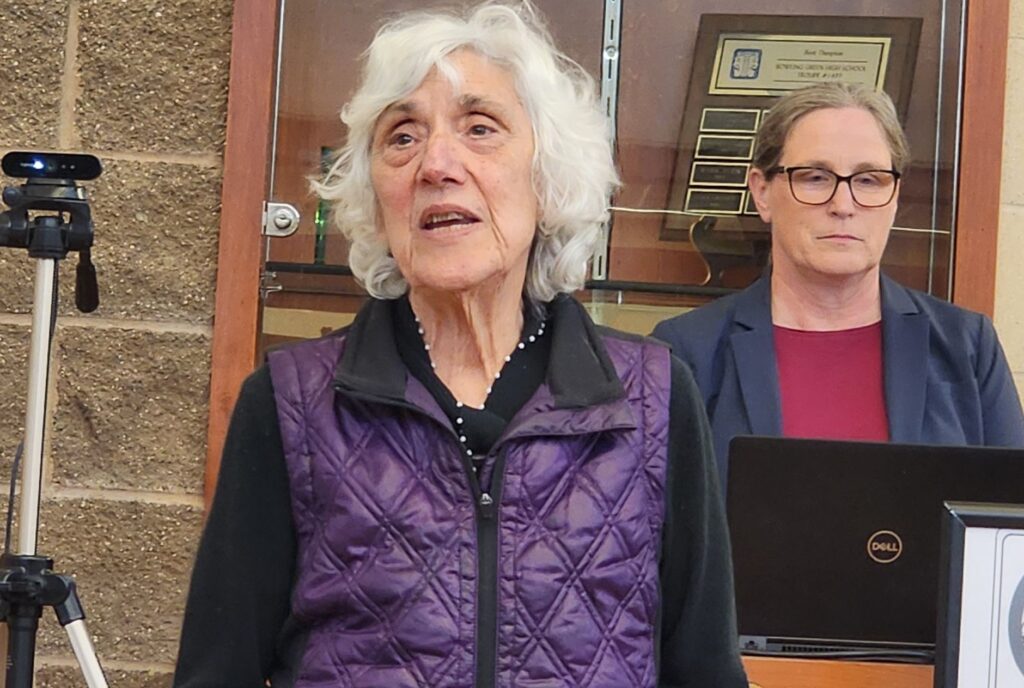
Alice Calderonello said she and her husband voted earlier in the day, in favor of the levy. She praised the excellent staff at the district’s schools.
And Karen Krueger spoke of the value of extra-curriculars, like sports, DECA, arts and music.
“They need those things,” she said of students. And those opportunities have long-reaching impacts. “They make things better for the world.”
Krueger acknowledged that the 0.75% income tax lasting five years will be a strain on her family.
“But we’ll make it work because it’s important,” she said. “It’s time to pay it forward – that’s the way it works.”
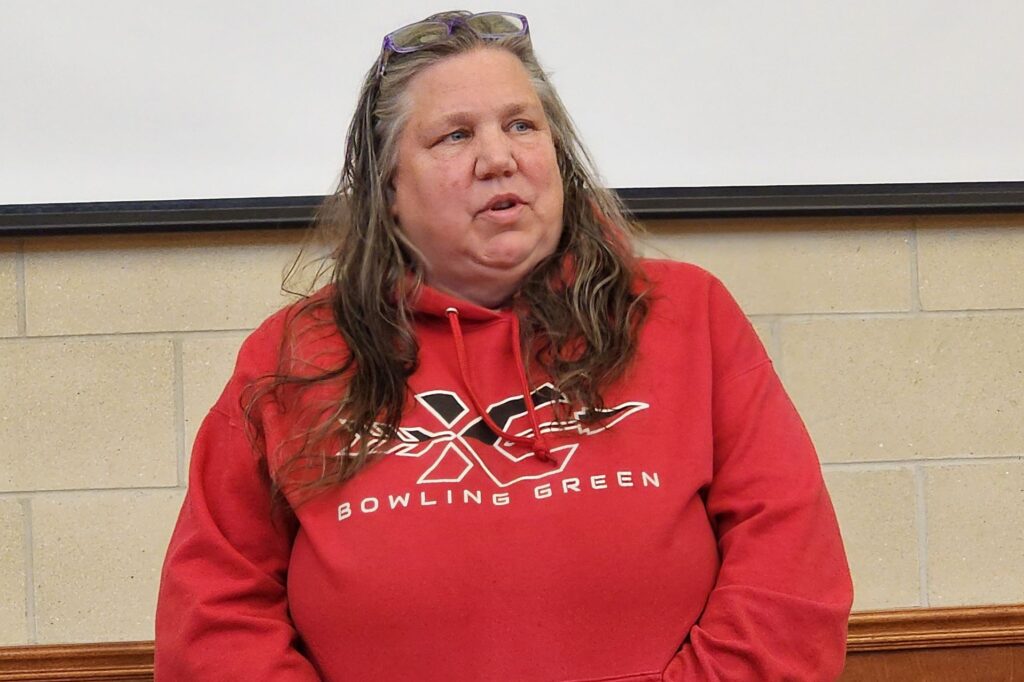
School Board President Norm Geer explained the income tax request is an effort to balance the demands on local residents who are more affected by property taxes. Geer also reminded that Social Security income is not taxed by the levy.
Superintendent Ted Haselman said he has been asked frequently why the district does not have “pay to play” to support athletics. He said the district has that payment system in place, and collects just shy of $40,000 a year in “pay to play” payments.
That is far, far short of the $2.6 million that the district needs to cut if the levy fails. Extra-curriculars cost the district approximately 29% of the total budget, or $750,000 a year.
Haselman and the board decided that voters deserved to know how the district would be affected if the operating levy does not pass. And Tuesday evening, he stressed that this will just be the beginning of cuts if additional funding is not approved.
“The need for additional revenue won’t go away,” he said. “This will be just the first round.”
Following is the list of positions and programs on the chopping block for the next school year (2025-2026), if this levy doesn’t pass, with an estimated savings of $2.6 million:
Staffing/positions eliminations:
- Assistant mechanic
- Athletic director
- Athletic secretary
- Bus drivers (7) (creating additional fuel savings)
- Crossing guards
- Custodians (2)
- District communication director
- Human resources generalist
- Inventory control/courier position
- Nurses (3)
- Performing Arts Center manager
- Student wellness coordinator
Teachers
- District wide music
- Elementary (4)
- High School English
- Middle School business education
- Gifted education
Program eliminations and reductions
- Extra-curricular activities (athletics, the arts – music and drama, clubs, yearbook, National Honor Society, etc.), and all athletic and non-athletic supplemental contracts eliminated
- District Gifted program
- District elementary orchestra program and reduced secondary music course options
- Contracted district mental health therapists and case managers
- No field trips or alternative educational opportunities district wide including fifth grade camp
- All buildings will be shut down at the end of the school day to outside entities to save on utilities and personnel costs (Girl/Boy Scouts, rec athletics, etc.)
Transportation reductions
District transportation will be limited to the following:
- Only transport students in grades PK-8 who reside more than two miles from school (no transportation within a two-mile radius of schools, both public and private/parochial)
- No high school student transportation provided except as required by law (Penta Career Center students: school-to-school only; no home pickup or drop off)
- With the reduced number of bus drivers, the size of each route will be significantly larger resulting in a substantial increase to student travel time on bus to and from school (up to 1.5 hours)
- Due to middle school students being transported with elementary students, the middle school day start and end time will move to 8:20 a.m. to 3:02 p.m.
Below is a list of the reduction percentages by category:
- Elimination of supplemental contracts: 29.3%
- Teaching staff: 22.1%
- Student Health and Wellness 13.7%
- Administrative staff 13.2%
- Reduction in transportation: 12.1%
- Remaining: Support staff, field trips, etc. 9.6%
Haselman also pointed out that as part of an annual review done by the district, some positions were already eliminated during the current school year, with an estimated savings of $421,693.55. Those included:
- Central administration treasurer’s office staff
- Elementary intervention specialist
- High school English teacher
- Para professionals (7)
District staff also worked to secure about $2 million in grants – also helping the budget, he said.
The board took steps in December to make the levy more palatable to some voters. For those who believe that no levy should be for a continuing period of time, the board agreed to limit the levy to five years. The board decided to stick with an income tax request, since district property taxes went up when voters approved the building of a new high school.
For those who wanted the district to use its pipeline tax revenue for operating expenses, rather than for building maintenance costs, the board agreed to shift $1 million of the pipeline money from building maintenance into operating funds.
And for those who have wanted more transparency of district finances, Treasurer Matt Feasel has been making the district’s monthly check register available for public viewing.

